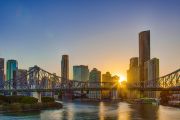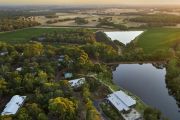
Atlassian tower the next frontier for reborn hostel operator
Two years out from its scheduled opening, hostel operator YHA Australia is already testing room concepts and bed types for a 450-bed property that will sit within the base of the $1.8 billion Atlassian skyscraper in the Sydney CBD.
The hostel will occupy the first five floors of a landmark 40-storey timber tower next to Central Station that is being developed by Dexus as the new headquarters for the software giant.

Construction is well underway and the new hostel – one of about 20 owner-operated properties in the 37-strong wider YHA network – is due to open at the end of 2026.
“This will be our flagship property,” said YHA Australia chief executive Paul McGrath, who has led a massive financial turnaround of the country’s biggest budget accommodation group since taking the reins during the pandemic.
“We’re working with Dexus to design the floor plates, and we’re doing targeted testing of what types of rooms to include.”
The Railway Square hostel will offer many of the hotel-like features being rolled out across other YHA properties such as co-working spaces, a bar, a coffee shop and a dining area.
It’s all part of a major revamp of the YHA offering aimed at re-imagining the hostel experience to cater for the new generation of cost-conscious travellers that has expanded far beyond the stereotypical backpacker.
In total $12 million has been spent by YHA in the past 12 months refurbishing three of its major city properties – two in Sydney and one in Brisbane. This includes upgrades to 170 private rooms and opening a rooftop bar at YHA Sydney Harbour at The Rocks that, according to Mr McGrath, “offers the best harbour views in the city”.

“In our space, everyone is lifting their game to offer better quality and service. As we improve the quality of our offering we will appeal to a broader market,” he told The Australian Financial Review.
“The whole notion of the hostel is changing. It’s now a hybrid hotel built around community and experiences.”
While just over 40 per cent of hostel guests are working holiday makers, experience seekers, families, school students, digital nomads and travel groups account for a high percentage combined, according to YHA’s own figures.
To cater for this diverse group, YHA is developing a wider choice of accommodation, from $ 40-a-night privacy bunks with their own integrated power, light and data points, to $230-a-night private rooms. In-room amenities now include 50-inch TV screens equipped with streaming services, SMEG tea and coffee facilities, and Bluetooth wireless charging ports.
YHA has also spent money turning shared bathrooms into “health club style facilities”, introduced more comfortable beds, put in new carpets and added fresh design elements across numerous properties. The F&B offering has been revamped with new bar, breakfast and cafe concepts rolled out.

With its technology platform recently upgraded, YHA can now implement dynamic pricing to take advantage – like traditional hotels – of peak periods of demand.
“Any major events, like footie grand finals, the Australian Open, a Coldplay concert, we can now seize on and adjust pricing accordingly,” Mr McGrath explained.
The 82-year-old membership-based organisation is also expanding its range of add-on tours and experiences: from scenic flights over the Great Barrier Reef to Barossa wine tours and mountain climbing.
This focus over the past two years on reinvestment in its properties and diversification of its business model has already borne fruit.
Revenue last year jumped over 40 per cent to a record $53.5 million, while earnings before tax topped $13 million as occupancy across the group’s 37 properties hit 80 per cent.
“We made good money in 2023 and this has provided the foundations for what we did this year,” Mr McGrath said. Earnings in 2024 are expected to be “on a par” with 2023, and occupancy slightly off at about 79 per cent.

As a “profit-for-purpose” business, all profits are invested back into the organisation.
And while competition is intensifying as groups like Bounce (which in November took over three former Selina flashpacker hotels) and Drifter Hospitality expand, an undersupply of budget offerings in markets such as the Gold Coast is creating expansion opportunities.
A November report by valuation and advisory firm M3 Property noted there were about 70 hotel and motel options at Surfers Paradise alone, but only 12 backpacker hostels located across the entire Gold Coast.
“The Gold Coast backpackers and hostels market has sizeable opportunities for operators to enter an undersupplied market,” said James Ruben, national director of specialised assets at M3 Property.

Mr McGrath said the Gold Coast and Sunshine Coast were markets where YHA has an eye on for potential acquisitions – it currently has one property in each of these locations.
But the main focus remains on ensuring the country’s biggest hostel business also has the best offering in the market, one which will get a major boost in late 2026, when it opens in the Atlassian tower.
“There is competitive pressure to keep upgrading our offering. There’s a lot of private equity investment coming into the market and all our competitors are improving their products,” Mr McGrath said.











